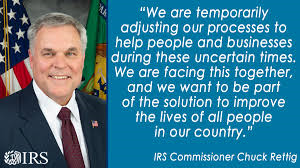The IRS People First Initiative aims to ease payment guidelines and postpone compliance and enforcement actions for an initial period of April 1, 2020 through July 15, 2020.

Automated Liens and Levies. Suspended.
Earned Income Credit & Wage Verification. Taxpayers have until July 15, 2020, to respond to the IRS to verify that they qualify for the Earned Income Tax Credit or to verify their income. IRS will not be denying these credits for a failure to provide requested information.
Field, Office & Correspondence Audits. More than likely, no new field, office or correspondence examinations will be started and the IRS will continue to work refunding claims where possible. One exception-The IRS may start a new examination just to preserve the statute of limitations.
General Requests for Information. In addition to compliance activities and examinations, taxpayers are encouraged to respond to any other IRS correspondence requesting additional information during this time if possible.
In-Person Meetings. None, but examiners will be working remotely. Taxpayers are encouraged to respond to any requests for information they already have received – or may receive – on all examination activity during this period if they can do so.
Installment Agreements.
Existing Installment Agreements. Taxpayers who are currently unable to comply with the terms of an Installment Payment Agreement, including a Direct Deposit Installment Agreement, may suspend payments – No payments due! Installment Agreements will not be defaulted on. Interest continues to accrue on unpaid balances.
New Installment Agreements. Taxpayers unable to fully pay their federal taxes can resolve outstanding liabilities by entering into a monthly payment agreement with the IRS. Call the IRS at 800-829-1040 (Good luck) or file a request online.
Non-Filers. If you have not filed a return for tax years before 2019, you should get to filing. Especially if you could get a refund and are in a county or state that’s not all the way opened – what else is there to do? July 15, 2020 is the absolute last day to file an original 2016 tax return to claim a refund. If the 2016 return was extended, the deadline is October 15, 2020.
More than 1 million households that haven’t filed tax returns during the last three years are actually owed refunds averaging $600.
Offers in Compromise (OIC).
Pending OIC applications – Taxpayers have until July 15, 2020 to provide requested additional information to support a pending OIC. In addition, any pending OIC request before July 15, 2020, will not be closed without the taxpayer’s consent.
OIC Payments – Taxpayers can suspend all payments on accepted OICs until July 15, 2020. Interest continues to accrue on unpaid balances.
Delinquent Return Filings – The IRS will not default an OIC for those taxpayers who are delinquent in filing their tax return for tax year 2018. However, taxpayers should file any delinquent 2018 return (and their 2019 return) on or before July 15, 2020.
New OIC Applications – Taxpayers facing a liability that exceeds their net worth can resolve outstanding tax liabilities through “Fresh Start.”
Private Debt Collection. None to be initiated.
Not that answering phones was ever an IRS strong suit – IRS live telephone assistance is currently unavailable due to COVID-19. We recommend not even bothering to call and instead do what you can online.
We are here to guide you through this process and anything else to help you get through COVID-19. Email info@accpas.com. Please put COVID-19 in the subject line. Or call us at 727-327-1999.
In addition to the monthly newsletter and weekly blog we will be sending COVID-19 updates through “Email Updates”.
Follow McAtee & Associates on your preferred social media for additional COVID-19 updates. We are on Facebook, Twitter, LinkedIn, and Google+.
Stay safe. Stay strong!
COVID-19 Disclaimer. Laws and regulations have quickly changed and will continue to change in order to mitigate the economic damage caused by the Coronavirus Crisis. New laws and regulations are being passed quicker than the legislative process has taken in the past. Guidance, clarifications, and interpretations are constantly evolving. Deadlines and due dates are being extended and re-extended. New relief and programs are constantly rising up. This is occurring on all levels: Federal, State, and Local. Information we publish may not be updated after initial publication/dissemination. We are committed to giving you the best answer possible based on what we know at the time your question is asked. Please keep all this in mind as we get through this together.
